|
|
|
Sort Order |
|
|
|
Items / Page
|
|
|
|
|
|
|
| Srl | Item |
| 1 |
ID:
127117


|
|
|
|
|
| Publication |
2013.
|
| Summary/Abstract |
Since the end of the Cold War, political scientists have radically reexamined the role that elections play in authoritarian contexts. Some argue elections are congruent with authoritarianism and actually help to stabilize non-democratic forms of rule. Others challenge this claim by arguing that elections can function as a mechanism for democratization. We test whether elections have functioned as a mechanism of change or of neo-authoritarian stability in the postcommunist world. We generally find that elections neither promote democracy nor strengthen authoritarianism. However, we do find that in energy-rich states elections promote authoritarianism, though of a somewhat more benign sort. We also find that the mechanisms of electoral participation and competitiveness thought to promote democracy function differently in the postcommunist context and explore this in greater detail through a paired case study of electoral mobilization in Slovakia and Belarus.
|
|
|
|
|
|
|
|
|
|
|
|
|
|
|
|
| 2 |
ID:
142735
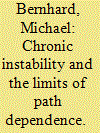

|
|
|
|
|
| Summary/Abstract |
Historical institutionalism challenged older forms of comparative historical analysis by moving away from purely structural explanations of historical outcomes. Instead it posited that there were critical junctures in which actors chose between institutional alternatives, which in turn led to path dependence. I examine a phenomenon neglected both by historical institutionalism and older forms of historical analysis—chronic instability. Instead of institutional lock-in, some junctures lead to periods of instability in which a series of regimes replace each other in rapid succession. Three different causal mechanisms that routinely contribute to chronic instability—external shocks, changing configurations of actors, and disjuncture between the logic of change and mechanisms of reproduction—are explored in depth. The plausibility of the theory is illustrated by an examination of regime instability in Germany from the collapse of the Empire in 1918 through the founding of the Federal Republic in 1949.
|
|
|
|
|
|
|
|
|
|
|
|
|
|
|
|
| 3 |
ID:
173765
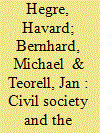

|
|
|
|
|
| Summary/Abstract |
We theorize that three distinct structures of democratic constraint explain why more democratic dyads do not engage in military conflict with each other. We build on earlier theories that focused on electoral and horizontal accountability. We add a new dimension—the social accountability provided by an active civil society. Using several new measures from the Varieties of Democracy (V-Dem) data set, we stringently test these explanations. We find social accountability to be the strongest and most consistent predictor of nonbelligerence in dyads, that horizontal accountability is still important, but that the independent role of electoral accountability has been somewhat overstated. However, we do find that social and electoral accountability work strongly together, to make for an even greater effect. The finding is robust to a range of specifications and in the face of controls for contending theories that challenge the democratic peace (e.g., the capitalist and territorial peace theories).
|
|
|
|
|
|
|
|
|
|
|
|
|
|
|
|
| 4 |
ID:
080168
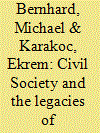

|
|
|
|
|
| Publication |
2007.
|
| Summary/Abstract |
The literature on civil society in postcommunist regimes highlights its weakness as compared with civil society in other democracies. In this article the authors make a general argument on how different patterns of antecedent dictatorship affect the development of civil society across a range of democracies. They examine the slow emergence of two behaviors associated with a robust civil society-participation in organizational life and in protest-and explain variation across countries as a function of regime history. They draw their individual-level data from the World Values Survey and analyze the behavior of over forty-one thousand citizens from forty-two democracies. Using methods of hierarchical linear modeling to control for both national-level and individual-level factors, the authors find that different types of dictatorship and variation in their duration produce different negative legacies for the development of civil society
|
|
|
|
|
|
|
|
|
|
|
|
|
|
|
|
| 5 |
ID:
105243
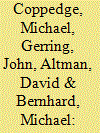

|
|
|
|
|
| Publication |
2011.
|
| Summary/Abstract |
In the wake of the Cold War, democracy has gained the status of a mantra. Yet there is no consensus about how to conceptualize and measure regimes such that meaningful comparisons can be made through time and across countries. In this prescriptive article, we argue for a new approach to conceptualization and measurement. We first review some of the weaknesses among traditional approaches. We then lay out our approach, which may be characterized as historical, multidimensional, disaggregated, and transparent. We end by reviewing some of the payoffs such an approach might bring to the study of democracy.
|
|
|
|
|
|
|
|
|
|
|
|
|
|
|
|
| 6 |
ID:
184249


|
|
|
| 7 |
ID:
050914


|
|
|
| 8 |
ID:
153929
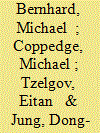

|
|
|
|
|
| Summary/Abstract |
We show how the V-Dem data opens new possibilities for studying civil society in comparative politics. We explain how V-Dem was able to extract embedded expert knowledge to create a novel set of civil society indicators for 173 countries from 1900 to the present. This data overcomes shortcomings in the basis on which inference has been made about civil society in the past by avoiding problems of sample bias that make generalization difficult or tentative. We begin with a discussion of the reemergence of civil society as a central concept in comparative politics. We then turn to the shortcomings of the existing data and discusses how the V-Dem data can overcome them. We introduce the new data, highlighting two new indices—the core civil society index (CCSI) and the civil society participation index (CSPI)—and explain how the individual indicators and the indices were created. We then demonstrate how the CCSI uses embedded expert knowledge to capture the development of civil society on the national level in Venezuela, Ghana, and Russia. We close by using the new indices to examine the dispute over whether post-communist civil society is “weak.” Time-series cross-sectional analysis using 2,999 country-year observations between 1989 and 2012 fails to find that post-communist civil society is substantially different from other regions, but that there are major differences between the post-Soviet subsample and other post-communist countries both in relation to other regions and each other.
|
|
|
|
|
|
|
|
|
|
|
|
|
|
|
|
| 9 |
ID:
178972


|
|
|
| 10 |
ID:
186659
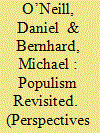

|
|
|
|
|
| Summary/Abstract |
You cannot be a political science journal editor these days without being inundated with manuscripts on populism. A high percentage of these start with the lament that despite its widespread use, there is no consensus over what populism is, that it is conceptually imprecise, and difficult to define. What usually follows is a discussion of several different influential conceptual works. This often begins with Laclau’s notion of populism as a countermovement to the failure of democratic representation under neo-liberal capitalism (Reference Laclau2005). After dancing around Laclau’s arguments about populism, popular sovereignty, and what constitutes democracy, most writers, ultimately, get around to Mudde’s widely cited definition and often adopt a version of it:
|
|
|
|
|
|
|
|
|
|
|
|
|
|
|
|
| 11 |
ID:
182040


|
|
|
| 12 |
ID:
078842
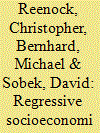

|
|
|
|
|
| Publication |
2007.
|
| Summary/Abstract |
Many scholars have argued that unequal socioeconomic distribution constitutes a threat to democratic survival. However, the evidence in support of this claim has been contradictory. We argue that this inconsistency derives from the literature's assumption that income inequality will adequately reflect the conditions under which demands for radical redistribution will emerge and trigger antidemocratic elite reactions. We argue instead that when developmental context is taken into consideration, absolute forms of distribution, like basic needs deprivation, are better indicators of these conditions. When needs deprivation exists in the face of enhanced economic development, citizens will not only notice deprivation more readily, but also, given the greater social surplus, deem it more unacceptable, provoking radical demands for redistributive justice. This combination of development and continuing basic needs shortfalls, a condition that we refer to as regressive socioeconomic distribution, will threaten democratic survival. Using event history analysis on a sample composed of all democracies from 1961 to 1995, we confirm that regressive socioeconomic distribution increases the risk of breakdown.
|
|
|
|
|
|
|
|
|
|
|
|
|
|
|
|
| 13 |
ID:
113754
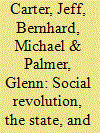

|
|
|
|
|
| Publication |
2012.
|
| Summary/Abstract |
Democracy has been the primary focus of our efforts to understand the impact of domestic institutions on processes of international conflict. In this article, we examine how a particular nondemocratic regime type, postrevolutionary states, affects military capabilities and war outcomes. Drawing on scholarship that conceptualizes revolutions as a unique class of modernizing events that result in stronger state structures, we argue that postrevolutionary states should be better able to mobilize populations and economic resources for military purposes. Tests performed on a comprehensive sample of twentieth-century states and interstate wars confirm our predictions: postrevolutionary states have larger, better funded militaries and achieve more successful war outcomes.
|
|
|
|
|
|
|
|
|
|
|
|
|
|
|
|
| 14 |
ID:
174464
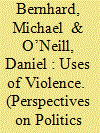

|
|
|
| 15 |
ID:
172880


|
|
|
|
|
|
|
|